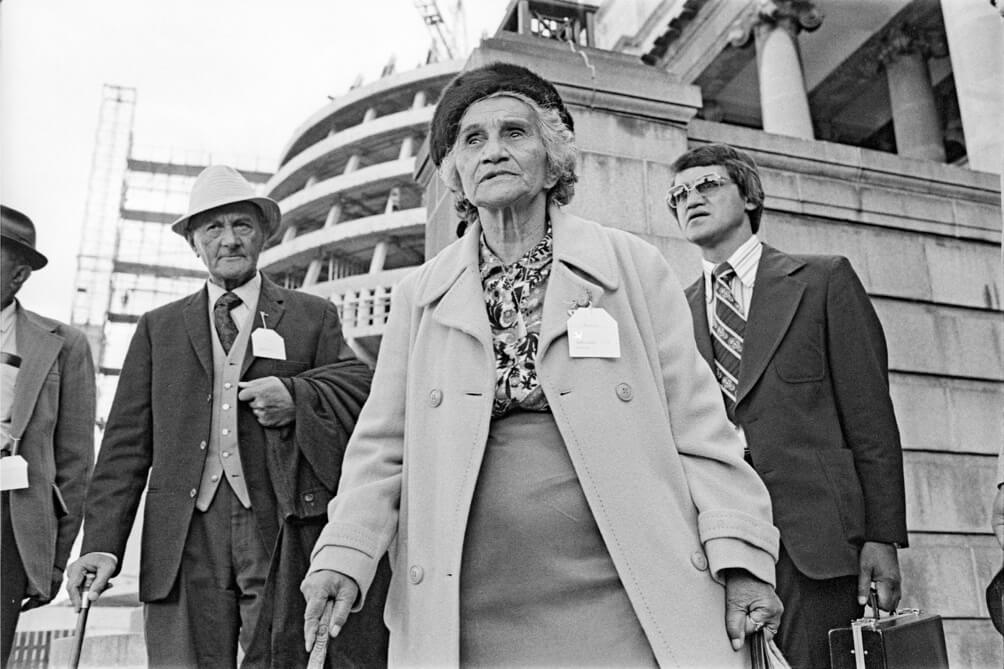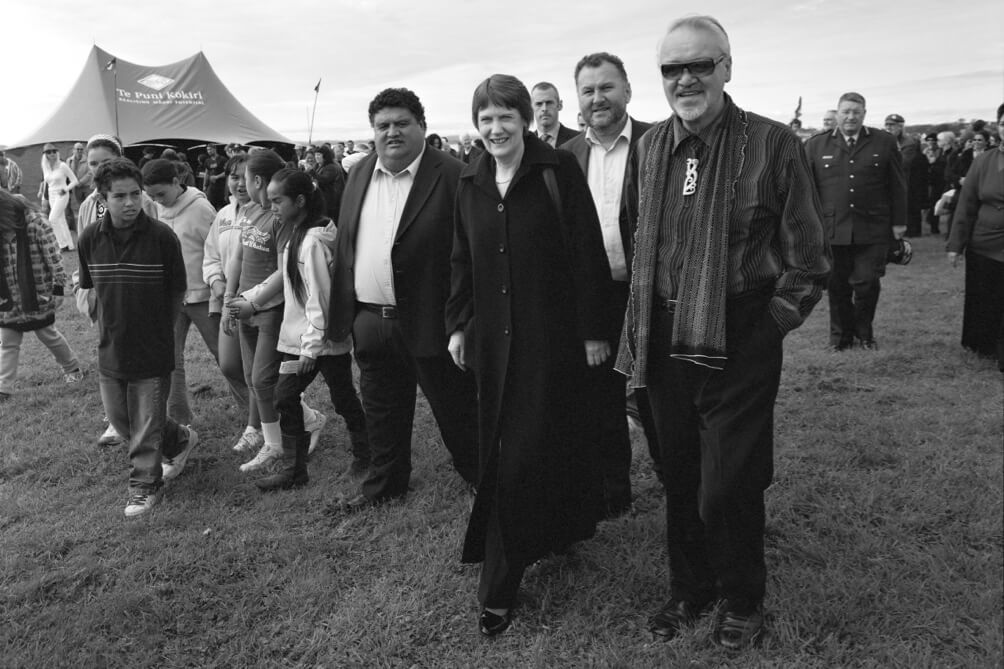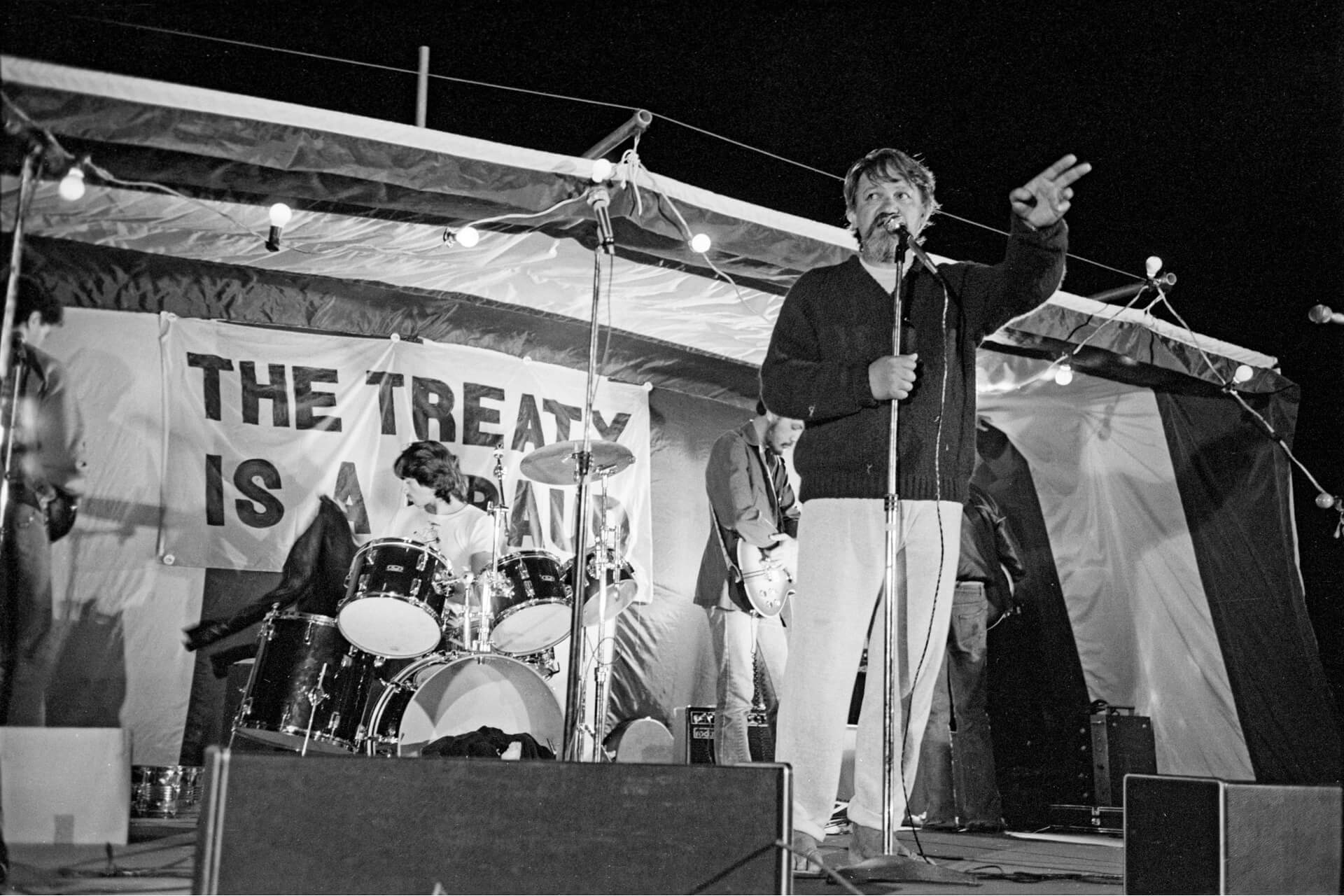Jul 13, 2022 Politics
Pictured: Joe Hawke addressing the 1984 Hīkoi Ki Waitangi members, during their overnight stay at Takaparawhau
On the service sheet for the day of his burial, on 26 May 2022 in Tāmaki Makaurau, Joe Hawke was described as “Son, Brother, Husband, Uncle, Koro, Friend, Superhero.” Hundreds of people arrived, in wave after wave of ope from around the country, to pay their respects to Joe; to express condolences to his wife, Rene, and to the whānau pani; to congratulate Ngāti Whātua Ōrākei on the strength of their commitment to tikanga and reo, and to acknowledge their role as mana whenua of central Tāmaki Makaurau.
In an unforgettable conclusion to the tangi, Joe was not buried in the iwi urupā in Ōkahu Bay. Rather, he was buried in the Bastion Point/Takaparawhau whenua that he strove so mightily to have returned to Ngāti Whātua Ōrākei and protected as whenua rangatira (chiefly land). He was buried within the memorial garden dedicated to Joannee Cooper-Hawke — the five-year-old who died in a tragic fire during the occupation in 1977. It was an exercise of tino rangatiratanga by the iwi that they decided he should be buried there. Official permission for burial in a plot other than in a cemetery will be sought afterwards. I am sure that retrospective official blessing for the burial will be forthcoming.
The memorial will thus gain further significance in highlighting the importance of the 506 nights of occupation led by the Ōrākei Māori Action Committee from January 1977 to May 1978. It was on 25 May 1978, day 507, when a massive army and police operation ended that occupation, demolished Arohanui meeting house and all other dwellings and left only the memorial to Joannee. Mātua Joe lay in state in his ancestral house Tumutumuwhenua for the 44th anniversary of that day of shame. He died in the knowledge that the struggle for Bastion Point Takaparawhau is now fully accepted as an inspiration for tino rangatiratanga aspirations of all iwi and hapū Māori, and indeed is an important aspect of our history for all peoples of the nation of Aotearoa. The acclamation received by Joe at the end of his life, however, is in stark contrast with the trials and tribulations he and his family suffered for many years.
Joe Hawke is a direct descendant of the rangatira Āpihai Te Kawau whose tuku rangatira (or gift) to Lieutenant Governor William Hobson in September 1840 provided for the establishment of Auckland. A century later, when Joe Hawke was born in 1940, the only land remaining to Ngāti Whātua Ōrākei in the entire Tāmaki isthmus, over which they had exercised their mana for some two centuries, was just 12 1⁄2 acres of land at Ōkahu Bay. Joe lived the first 11 years of his life in that papakāinga beside the meeting house Te Puru o Tāmaki. His childhood was spent on the land in that bay, fishing for seafood and playing hide-and-seek with his cousins and siblings. Then, in traumatic circumstances, which he has recounted on many occasions to explain the mamae or hurts of his people, in 1951, the government used the Public Works Act to take all those remaining acres, apart from a quarter-acre urupā. The hapū were left landless, the dwellings of the papakāinga were demolished and Te Puru o Tāmaki was burned down. The Hawke whānau were among those who lost their home and became tenants in Māori Affairs Department houses set well apart from the streets of state housing in the rest of Ōrākei, and from the mansions of Paratai Drive on the opposite headland.
In 1975, Te Rōpū o Te Matakite, led by Dame Whina Cooper, organised the Māori Land March. Joe was a leading member of Te Matakite that walked from Te Hāpua in the
far north to Parliament in Wellington, and later became its secretary. With his family, he took time out from running his business to be part of that historic reassertion of the importance of land, and its loss, for Māori.

With Whina Cooper at Parliament, after a delegation from Te Matakite met with Minister of Maori Affairs Duncan MacIntyre and MP Jim Bolger, in February 1976
When the Land March entered Tāmaki Makaurau, the marchers famously did so by walking across the Harbour Bridge despite the efforts of the authorities to dissuade them otherwise. At their head that day, holding high the pouwhenua of Te Matakite, was Joe Hawke. He and his whānau also gathered seafood to help feed the marchers and their supporters at Te Unga Waka marae. Joe was prosecuted for breaches of the Fisheries Regulations in spite of his assertions that he was exercising customary rights in order to demonstrate manaakitanga towards manuhiri in his rohe. Aggrieved by this prosecution, he took a claim to the newly created Waitangi Tribunal that had been established by an Act of Parliament in 1975. He has the honour of being the very first claimant to be heard by that tribunal. His Wai 1 claim was heard in 1977 in the incongruous setting of the ballroom in the Intercontinental Hotel (now the Pullman Auckland Hotel). The Tribunal refused to inquire into the merits of the Wai 1 claim and dismissed it for technical reasons.
By that time Joe was leading the Ōrākei Action Committee’s occupation of Bastion Point Takaparawhau alongside Grant Hawke, Jack (Mike) Rameka and Roger Rameka. Joe was very much the inspirational leader. Nowadays the occupation is seen as a pivotal movement in terms of Māori rights and is praised by many. One Member of Parliament, speaking in the House for the third reading of the Ngāti Whātua Ōrākei Claims Settlement Bill in 2012, said that the occupation led by Joe Hawke appealed to the conscience of New Zealanders, drew support from all kinds of people, opened the eyes of Pākehā New Zealand to the injustice of land loss and Treaty breach, and inspired change in this country.
It needs to be said, however, that the Bastion Point Takaparawhau struggle and its aftermath cost Joe, Rene Hawke and their whānau dearly. Though almost everyone now claims to have always supported Ngāti Whātua, that is not true. Joe was pilloried by many people for many years. After 1978, he was unable to re-establish his business or indeed to obtain any significant employment for many years. He was reviled as a ‘protestor’, not as a ‘protector’ of his hapū land. He was not deterred. He took a leading role in further claims to the Waitangi Tribunal – Wai 9 in 1985–87 that eventually led to the Ōrākei Act 1991 and legally restored the occupied land to the hapū. By then the tide of history was beginning to turn. He was elected vice chairman of the Ngāti Whātua o Ōrākei Trust Board that settled the Surplus Railway Lands issues in 1992 and he was elected a list Member of Parliament for the New Zealand Labour Party, serving for two terms between 1996 and 2002. He was vice chair of the Trust Board whose members lodged the Wai 388 claim to settle the wider historical grievances of the hapū, and which finally led to the 2012 Settlement Act.

Escorting Prime Minister Helen Clark, with MPs Shane Jones and Parekura Horomia, during the 30th anniversary of the police invasion, 25 May 2008
Year in and year out, Joe has continued to speak of the injustices of the past, and to proclaim the importance of struggles for justice — especially in welcoming rōpū to Ōrākei marae, and most recently the occupation at Ihumātao. But only late in his life have his efforts been suitably recognised by the nation. In 2008 he was invested with the insignia of Member of the New Zealand Order of Merit (MNZM) for services to Māori and the community. In December 2021, the University of Auckland/Waipapa Taumata Rau bestowed on Joe an honorary Doctor of Law (LLD) degree.
Titahi, a seer from Ngāti Whātua in earlier times, had a vision which is rendered as a frequently sung waiata in these parts: “He aha te hau e wawara mai. He tiu, he raki, he tiu he raki. Nāna i ā mai te pūpūtarakihi ki uta. E tikina atu e au ki te kōtiu kukume mai ai? Koia te pou whakairo ka tū ki Waitematā i oku wairangi e.”
“What is that wind roaring and rumbling? It was the wind in the north, a wind that brought the nautilus shell ashore. I must fetch that new power and stand it here in the Waitematā alongside and as a new mana.”
The vision of that ancient seer sought to enhance the honour and mana due to Ngāti Whātua. The life and work of Joe Hawke has contributed greatly to the mana of his people.
David V Williams FRSNZ is a professor emeritus in the Faculty of Law at the University of Auckland Waipapa Taumata Rau and had the privilege of being a friend of Joe and Rene for 47 years of Joe’s life.
–
This column was published in Metro 435.
Available here.







